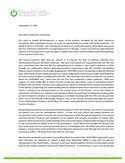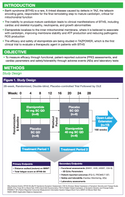Elamipretide Petition: More Information
Below you will find more information including the recording of discussions with participants, meeting information, and letters of support relating to the elamipretide advocacy efforts. Check back frequently as we will update this page as progress develops.

Click the button below to get answers to the most frequently asked questions related to elamipretide, TAZPOWER, and the petition.


-
September 22, 2020: During our September 25th Friday Roundtable, Dr. Hillary Vernon, primary investigator of the TAZPOWER clinical trial, will highlight important findings from the study, including side effects, primary endpoints and additional improvements observed in the study.
Details: Friday September 25, 2020 | 12 pm Eastern Daylight Time (EDT) | To join (via Zoom), visit bit.ly/BSFvirtualchats.
-
September 18, 2020: Our team at Stealth BioTherapeutics is aware of the petition circulated by the Barth Syndrome
Foundation (BSF) regarding provision of access to elamipretide for people with Barth syndrome. On
behalf of all of us at Stealth, I am reaching out to express our continued support of the Barth community
and our continued commitment to progressing access to therapy. I assure you that we understand the
urgency of ensuring access to safe therapies to address the severe unmet medical needs affecting many
of you and your loved ones. (Click image on left to continue reading)

-
TAZPOWER is the first clinical trial to evaluate the tolerability and efficacy of a potential therapeutic agent in patients with BTHS. At 36-week OLE, ELAM therapy was well tolerated and associated with improvements in the 6MWT, Total Fatigue Score and subject-reported assessments with a trend toward increased LVEDV and stroke volume.
-
The results of this study provide the first biochemical evidence in human subjects with Barth Syndrome that ELAM treatment 1) stabilizes or elevates several metabolic markers and relationships directly linked to normal central energy metabolism, and 2) stabilizes or reduces likely metabolic markers of relatively inefficient fuel metabolism, viz., C12-AC, C14‑AC, 3‑OHB and 3-MGC.









